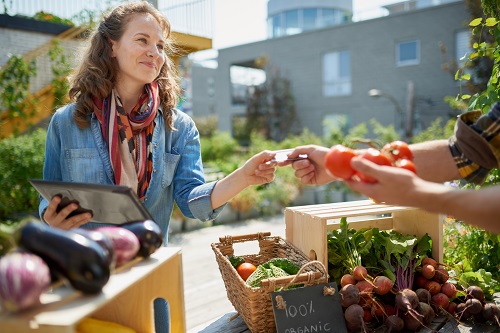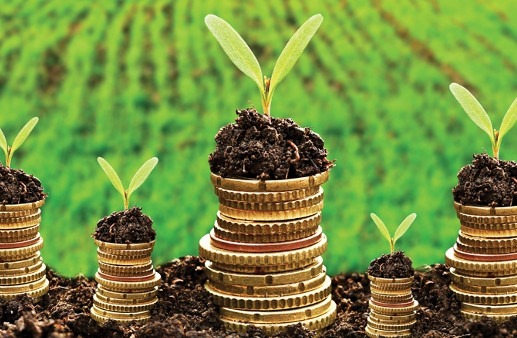GREEN entrepreneur
Courtesy : www.businessnewsdaily.com/
A green industry business is one that uses sustainable materials to make its products. Green industry businesses aim to use as little water, energy and raw materials as possible while cutting carbon emissions, or it finds ways to utilize these materials in renewable and eco-friendly ways. This business approach minimizes the company’s strain on natural resources and contributions to climate change. In some cases, if waste is generated, it is reused as energy or raw material.
What is a green business model?
With a traditional business model, a company outlines raw material budgets, design processes, and service delivery or product distribution methods. A green business model, while ensuring ample revenue, prioritizes minimizing the company’s environmental impact instead of maximizing its profit. It may involve the restricted use of fossil fuels while emphasizing power supplied by solar panels and other approaches to drastically reduce energy consumption.
How do I start a green business?
As consumers have come to care about CSR, a greater number of green businesses have emerged, but the problems that climate change poses require many solutions. Thus, to start a green business, first identify an eco-friendly service that nobody in your market currently offers. Then think of similarly eco-minded people you know whom you could ask to join your team. Read our guide on how to start a business.
As you launch your green business, change your lifestyle to reflect the values and services of your business.
What companies are eco-friendly?
Eco-friendly companies may include outdoor apparel brands, businesses that make reusable plastic bottles, eco-friendly cleaning companies, businesses that install solar panels, a local recycling business, and many other potential ventures. If you’re looking to start your own eco-friendly, green industry business, consider any of the 23 ideas below.
1. Ink refill business
Starting an ink-refill business can not only be a highly profitable decision, it can be an environmentally conscious one, too. You might question whether refilling ink cartridges truly helps the environment considering the amount of paper that is wasted each year. However, by reusing old ink cartridges, there is less nonbiodegradable waste accumulating in landfills. Paper is still necessary in the business world, but empty ink containers are not.
2. Environmental publications

If you love to write, start your own environmentally minded publication. Your actions can make a big difference in the world. By debunking popular myths and sharing the truth about the world we live in, you can help consumers rethink how their actions affect the planet.
3. Green finance
Green finance focuses on supporting local, community-level projects with an emphasis on sustainable, ecologically friendly agriculture. Green finance is also typically concerned with providing educational opportunities, funding for artistic endeavors and projects that support local ecology.
Green finance is preoccupied with social profitability. While monetary profit remains important, the goal of green finance is to support beneficial projects that provide value to the local community and ecology.
4. Eco-friendly retail
Consumer rewards programs are popular among retailers, and e-commerce site EcoPlum is no exception. With every purchase, customers earn EcoChipz, which are redeemable for either rewards or a donation to various environmental causes. Each product sold also carries a third-party green certification or an equivalent eco-label.
Besides selling sustainably sourced products, EcoPlum produces educational content, including monthly columns by industry experts, local green business listings, recycling information, eco tips, and book and video recommendations. If you’re considering opening a retail store, consider partnering with a company that has similar values as you and your customers.
5. Sustainable construction materials

You might not think of construction as sustainable, but some companies now provide recycled materials for use in projects like infrastructure repair.
Axion, for example, with its eco-friendly products, hopes to change the way companies think about rebuilding America’s infrastructure. The company’s railroad ties and pilings are made from recycled plastic from consumer and industrial uses rather than nonsustainable materials like steel and concrete. Axion is currently working with major partners like Long Island Rail Road to improve infrastructure safely and sustainably in the United States.
6. Organic catering
A great way for eco-friendly foodies to share their passion for food and the environment is to start an organic catering company. By catering local events and business luncheons with foods containing organic and locally grown ingredients, free-range meats, and vegan, gluten-free, and paleo meal options, you’ll appeal to nature lovers and health and wellness enthusiasts alike.
Be sure, though, to minimize the impact on the environment by avoiding plastic and paper goods as much as possible and composting food waste.
7. Eco-friendly beauty salon
If cosmetology is your passion, start a beauty business that’s Mother Nature-approved. Organic and vegan hair and beauty products are popping up everywhere. A way to make this trend work for you is to open an eco-friendly beauty salon. You can open a hair salon that uses all-natural shampoos and conditioners or a nail salon that uses environmentally friendly and vegan polishes and spa treatments.
8. Eco-friendly landscaping

Source: welcomia / Getty Images
Professional landscaping may make your lawn and garden look nice, but all of that maintenance isn’t necessarily great for the environment. With some eco-friendly advice and know-how, you can help homeowners make their yards literally and figuratively greener. SheKnows recommends synthetic turf, drought-resistant plants and strategically placed trees for a lawn that saves water, energy, and money.
9. Sustainable event planning
Whether they’re big or small, meetings and events can generate large amounts of waste and consume valuable resources. Green event planners use their expertise and event-planning skills to find eco-friendly venues, materials, and accommodations.
Sustainable event management benefits more than just the planet. There are financial advantages, plus it generates a positive image for event organizers, vendors and stakeholders while raising awareness, and inspiring change in the community.
10. Bicycle repair and refurbishing
Biking short distances instead of driving is better for the environment and your health. Like most modes of transportation, bicycles occasionally need a tune-up.
You could be the expert cyclists come to when their bikes need repairing or maintenance. If you have some extra space, you could purchase inexpensive older bikes, fix them up and sell them for a profit.
11. Handmade all-natural/organic products
Soaps, cosmetics and cleaning products are just a few of the household products that can be made using common organic materials.
Sure, anyone can find a recipe for a sugar scrub or vinegar-based cleaning solution and do it themselves, but if you package and sell them in sets, your customers conveniently have those all-natural products at their fingertips. Local markets and events are a good place to sell, or you could start an online store.
12. Eco-consulting
Are you an expert on green living? Start an eco-consulting service. Consultants evaluate homes and offices, and offer solutions to make them more environmentally friendly.
You could advise clients on switching their home appliances to more energy-efficient machines or implement a recycling program. To further boost your credibility, become a certified eco-consultant.
13. Farmers market vendor

Thanks to the organic movement, those with a green thumb have a golden opportunity to earn money by selling non-GMO, pesticide-free produce at their local farmers market.
Selling naturally grown fruits and vegetables gives you a distinct advantage over competing growers who use conventional farming methods, including pesticides. You may have to be approved and/or get certified by your local board of health first before you can begin selling.
14. Green housekeeping services
For working parents, cleaning the house can be at the bottom of the to-do list. Market yourself as the green solution to their housekeeping woes by offering services that range from light dusting to heavy-duty chores like cleaning the kitchen and bathroom, using only approved all-natural and eco-friendly cleaning products.
Charge an hourly rate or create your own service packages for a flat fee. Remember, your clients are giving you access to their homes. Build a trustworthy reputation with people you know first before advertising to strangers.
15. ‘Upcycled’ furniture
Don’t throw out your old, broken furniture. With basic templates and access to power tools, you can break down and reassemble chairs, tables and dressers into new pieces that you can paint and sell. Shelving and storage units are easy to make from wood scraps, and depending on the item, you might even be able to fully restore a unique and valuable piece of furniture.
Alternatively, you could reupholster old chairs and couches, giving them new life. Buying secondhand doesn’t just save money, it also helps the environment.
16. Green franchises
Want to run a business with a solid brand and customer base already in place? Investing in a franchise might be the answer. While franchising might call to mind fast-food joints and hotel chains, there are many eco-friendly franchise businesses.
17. Secondhand store

New things are typically expensive, and pretty soon, those costs add up. For example, a new book could cost $15 to $30, while a used book usually costs only a couple of dollars.
Opening a secondhand store not only saves your customers money, it’s better for the environment. Instead of tossing a perfectly good item into the trash, encourage consumers to donate their used items to you so another person can get value out of that item. You can sell used clothes, coats, books, kitchen appliances and furniture.
18. Green consulting

Whether it’s cutting energy costs or reducing their carbon footprint, the pressure for businesses to adopt green practices is high, and it’s only going to grow.
Business sustainability consultant Barbara Englehart said there are numerous benefits for companies that go green, including reduced costs, risks and liabilities, and increased employee retention and productivity.
“This is all quite new in the business world, and companies need help,” Englehart told Business News Daily. “They weren’t teaching sustainability in business schools five or 10 years ago.”
19. Solar panel installation
Many green-minded homeowners have installed solar panels on their homes, and many more would like. If you know how to do this, offer this service in your area.
20. Eco-friendly cleaning
Common cleaning products contain chemicals that contribute to pollution, and harm people and pets that come in contact with them. Starting an eco-friendly cleaning business counters this problem. Your eco-friendly cleaning business can exclusively use nontoxic products or use brands that minimize their use of single-use plastics. You can further decrease your company’s environmental impact by reusing greywater whenever possible.
21. Reusable plastic bottles
Single-use plastics are indisputably a leading cause for concern among environmentalists. Offer people a way to drink water on the go without contributing to plastic pollution by launching a green industry business that designs, produces and sells reusable plastic bottles. Explore using alternative materials such as metal or glass, bottles made from recycled plastic, or renewable plastics from materials like corn starch or sawdust.
22. Environmental impact and carbon emissions lessons
Many people aren’t aware of just how much carbon emissions their daily activities produce and the impact those activities have on the environment. Offer classes to educate the public about how driving, using air conditioning in the summer, leaving lights on unnecessarily, flying and other activities contribute to carbon emissions. You can also teach people how to reduce the environmental impact of these activities.




